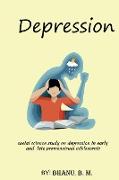Social science study on depression in early and late premenstrual adolescents
BücherAngebote / Angebote:
INTRODUCTION In the life cycle of a human, adolescence is a period of transition from childhood to adulthood. It is characterized by rapid physical, biological and hormonal changes resulting in to psychosocial, behavioural and sexual maturation between the ages of 10-19 years in an individual. Adolescence is often described as a phase of life that begins in biology and ends in society. It means that physical and biological changes are universal and take place due to maturation but the psychosocial and behavioural manifestations are determined by the meaning given to these changes within a cultural system. The experience of adolescents during teen years would vary considerably according to the cultural and social values of the network of social identities they grow in. Adolescence is derived from Latin 'adolescere', which means 'to grow up'. It is an intermediate stage of physiological and psychological growth that commonly occurs during the period from puberty to legal adulthood (Marcell, 2007). Adolescence is typically connected with the teenage years of the individual, but its physiological, psychological or ethnic expressions may originate earlier and end later. For example, puberty now typically begins during preadolescence, particularly in females. Physical growth (particularly in males) and cognitive development can extend into the early twenties. Thus, age provides only a rough marker of adolescence, and scholars have found it difficult to agree upon a precise definition of adolescence. A complete understanding of adolescence is dependenton the multiple information from different perspectives, which is inclusive of psychology, biology, history, sociology,
Folgt in ca. 10 Arbeitstagen
